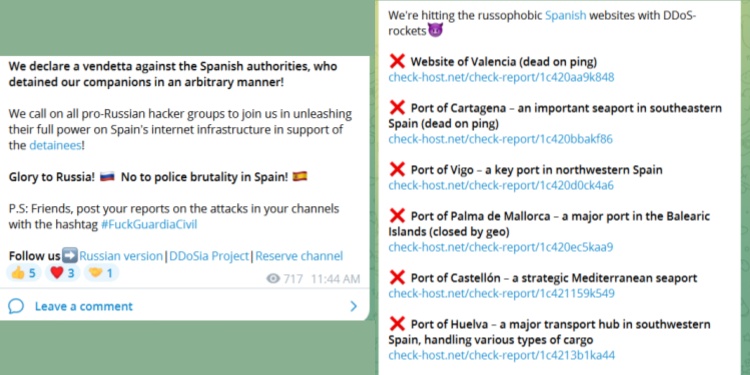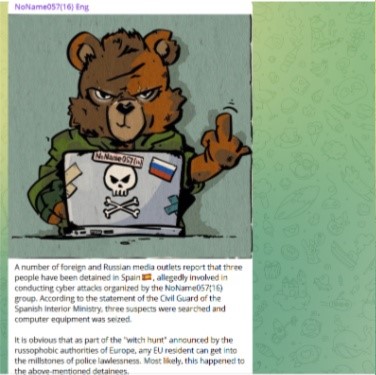After three of its members were arrested by Spanish authorities over the weekend Pro-Russian hacktivist group NoName(057) unleashes a wave of attacks against Spain.
Spanish police declared thearrest s on Saturday, blaming the three suspects for completing affirmed cyberattacks against Spain and fellow NATO partners who support Ukraine for terrorist purposes.
According to police reports, the suspects were “searched and computer equipment was seized.”
NoName is well-known for its distributed denial of service (DDoS) attacks, which typically target the websites of Western governments and critical infrastructure organizations in Israel, Ukraine, the EU, and the United States.
“These computer attacks have been organized by the hacktivist group NoName057(16),” Spain’s Civil Guard stated in a statement, “which started after the invasion of Ukraine by Russia and (which) has been) one of the most active.”
On the social media platform X, Spanish authorities posted a video of the raid that showed the home of one of the suspects with a wall-mounted Soviet-era hammer and sickle flag.
Three individuals have been arrested by Spanish authorities on suspicion of carrying out hacking operations on behalf of Russian security agencies. It is believed that the detainees are members of a group of pro-Russian hackers known as NoName057.
The police stated, “This group acknowledges in their own founding manifesto that they will respond proportionately in response to the hostile and openly anti-Russian actions of Western Russophobes.”
Revenge is vowed by NoName
The hacktivist group posted a vengeance manifesto on its Telegram channel almost immediately after the arrests and launched a series of DDoS attacks against critical Spanish infrastructure in retaliation against the EU nation.
“We declare a vendetta against the Spanish authorities, who lawlessly detained our comrades!” the group posted Monday, labeling the operation a “witch hunt.”
It continued, “Glory to Russia!” and read, “We call on all pro-Russian hacker groups to join us in unleashing all of their power on the Internet infrastructure of Spain as a sign of support for the detainees.”
The staunch Russian allies then, at that point, continued to claim attacks against Spain’s infrastructure including on the city of Valencia, and the significant ports of Cartagena, Vigo, Castellón, Palma de Mallorca, and Huelva.
On Monday, the group also carried out attacks on more than a dozen Czech Republic sites.

In a longer post that followed, NoName boasted that authorities in the US and EU were “afraid of us like hell” and that the group had been able to cause “enormous damage to all sponsors of the Zelensky criminal regime around the clock” for years.
The cyber terrorists stated, “Our Cyberarmy is growing by the hour, day by day,” and added that Europeans are “frankly outraged” that their governments “sponsor Zelensky’s terrorists, to the detriment of their economy” with “huge amounts of money.”
The post was accompanied by an image of its unique Russian bear flipping off Spain with its center finger.

According to police, the three arrests were made in the municipalities of Huelva and Seville in southwestern Spain, as well as Manacor, the second-largest town on the Balearic island of Mallorca.
The attacks by NoName keep coming
In March 2022, NoName made its official debut as a political response to the West’s opposition to the Russian invasion of Ukraine.
As per threat researchers at Radware, NoName057(16) works involving Telegram channels where they claim responsibility regarding their attacks, mock targets, make threats, and share educational content.
DDoS attacks work by directing high volumes of internet traffic towards targeted servers, flooding the sites and knocking them offline.
A Radware research report found that NoName carried out 1174 attacks in 32 Western nations in just 176 days in the first half of 2023. This is to put the group’s efforts into perspective, as DDoS attacks are frequently viewed as more of a nuisance than causing permanent or lasting disruptions.
NoName hacking efforts in 2023 effectively designated NATO, Italy’s financial framework, a few of Europe’s biggest ports, and Ukraine’s monetary area.
The French parliament, Poland, Denmark, Lithuania and nearly a dozen attacks on Switzerland’s financial and aviation sectors were also cited as examples of critical infrastructure attacks.


